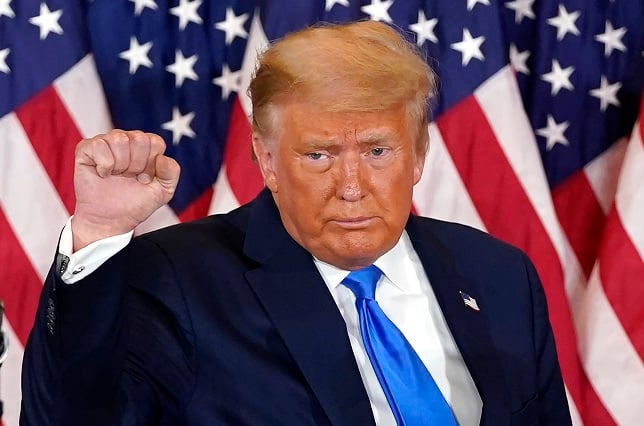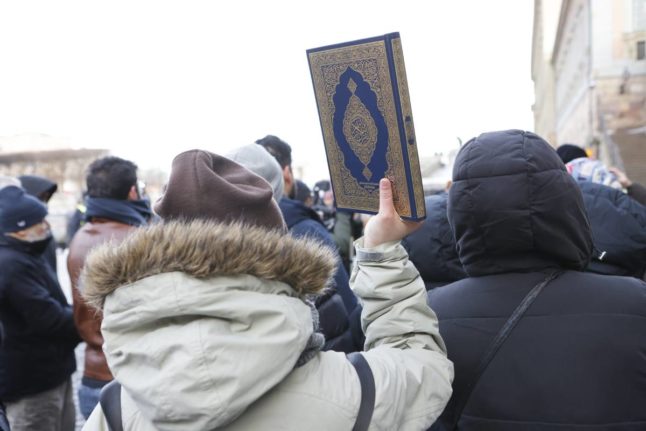On Wednesday, the race was still close to neck-and-neck between President Donald Trump and Democratic challenger Joe Biden, with many votes remaining to be counted and a final result not expected for days.
But Trump said he had won the election, baselessly saying “major fraud” had taken place and appearing to call for votes not to be counted.
In a brief press conference about the US election, Swedish Foreign Minister Ann Linde began by saying that the high voter turnout “is a sign of good democratic health”. She did not condemn Trump's comments, but called on viewers to avoid speculation and to “allow the American system to work”.
While Linde was restrained in her comments, other Swedish politicians did speak out about the president's actions.
The leader of the Swedish Left Party, Nooshi Dadgostar, told public broadcaster SVT that Trump “is twisting the democratic method we have to hand over power peacefully”, while the leader of the Centre Party Annie Lööf described Trump's actions as “upsetting and worrying” and “lacking democratic instincts”.
Political scientist Ian Higham, who works at Stockholm University, said the cautious official response could be seen as hypocritical given Sweden's stance as a defender of democracy.
“I don't think they would tolerate some of the things Trump does if it was happening elsewhere, in a country that's smaller and maybe has a greater history of corruption,” he told The Local.
-
Opinion: Swedish democracy is strong, but there are warning signs
- Sweden dismisses Trump's claim after US president takes swipe at coronavirus strategy
But it's not the first time Sweden has kept quiet about actions harmful to democracy in the US. President Trump has refused to condemn white nationalist groups, and repeatedly labelled the national media as “the enemy of the people”.
“That's a criticism Sweden might level against a government in Belarus or Russia, but when the US does it they're pretty silent so I'm not that surprised that they're not commenting today,” Higham said.
The same pattern is repeated when it comes to moves to restrict rights to safe and legal abortion, or related to the rights of women and children.
“I don't think I've seen a Swedish politician comment publicly on the fact that more than 500 children have been separated from their parents by the current administration and the parents and children cannot be reunited. Forcibly taking a child away from their parent should be part of [Sweden's] feminist foreign policy and yet it's not something that's criticised.”
“I think Sweden would be more likely to criticise it there than in this powerful country that has a very important relationship with Sweden, not least economically.”
That important relationship encompasses security collaboration as well as trade, with Sweden the USA's 13th largest investor and hundreds of thousands of jobs in each country directly linked to trade between the two.
In some ways, Swedish-US relations have even strengthened under Trump's four-year term. Speaking on Wednesday, Foreign Minister Ann Linde described deepening this relationship as “one of my most important tasks”.

Foreign Minister Ann Linde. Photo: AP Photo/Burhan Ozbilici/TT
That's even despite the American president's criticism of Scandinavian social democratic policies, including the comment “you wouldn't believe what happened last night in Sweden“, referring to a YouTube documentary about immigrants and crime in Sweden which has been widely discredited.
The key example of positive development is Sweden's role in facilitating talks between the US and North Korea, giving the Scandinavian country greater prominence in Washington.
Meanwhile, Sweden's relationship with the other major superpower, China, has deteriorated during Trump's time in power due to issues including the imprisonment of Swedish dissident Gui Minhai and repeated threats from China towards the Swedish media.
But according to Higham, the main reasons for the lack of intervention from Swedish politicians is nothing to do with Trump himself.
“Resources would be poorly spent wasting too much political capital on the US, which isn't likely to change based on what Sweden says, but an aid-receiving country like Uganda may be more likely to listen,” he said.
“And the US is still mostly seen as a country that's democratic and respects human rights. Sweden's promotion of human rights and democracy and human rights is tied up with its reputation, so I think Sweden may be more likely to vocalise this view when it's going to be seen as worthwhile.”
“Swedes and the Swedish press are pretty happy to criticise Trump, he's not very popular here, but Sweden in general is reluctant to criticise the US government no matter who's in power in either country,” Higham explained.
-
How robust is Sweden's democracy? (Clue: not very)
- ANALYSIS: Why has Sweden never had a female Prime Minister?
As for whether Sweden will change its attitude towards the superpower, that likely depends at least in part on the result of the election, which should become clear later this week.
If Trump wins fairly, Higham doesn't anticipate significant change in these relations, but should the president attempt to hold onto power through illegitimate means such as ignoring votes, this could be something that tips the balance.
“There might come a point at which attacking the media, or challenging the counting of votes may not be something Sweden can ignore. Sweden has sought to play a big role in countries like Belarus that don't recognise democratic election results so a situation like that would become almost untenably hypocritical,” he said.
Sweden's Linde was not the only European minister to refuse to condemn Trump's actions.
British Foreign Minister Dominic Raab repeatedly said he did not want to “comment on the commentary” by saying whether the president was right or wrong to say he had won before many states had counted their votes.
Slovenian prime minister Janez Janša echoed Donald Trump's false early claims of a victory, accusing the media for “denying facts” in a tweet which was labelled by the social media platform as misleading.
It’s pretty clear that American people have elected @realDonaldTrump @Mike_Pence for #4moreyears. More delays and facts denying from #MSM, bigger the final triumph for #POTUS. Congratulations @GOP for strong results across the #US @idualliance pic.twitter.com/vzSwt9TBeF
— Janez Janša (@JJansaSDS) November 4, 2020



 Please whitelist us to continue reading.
Please whitelist us to continue reading.
Member comments